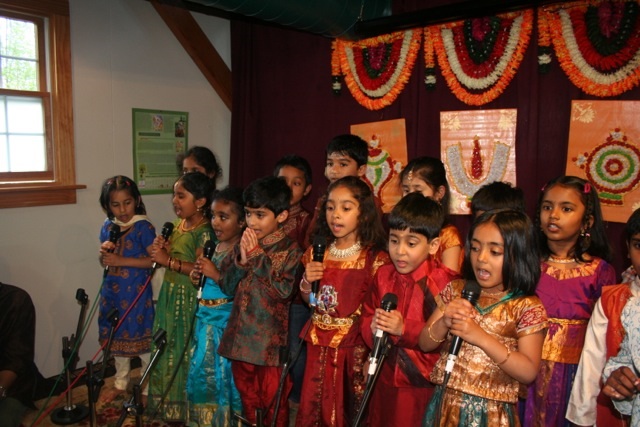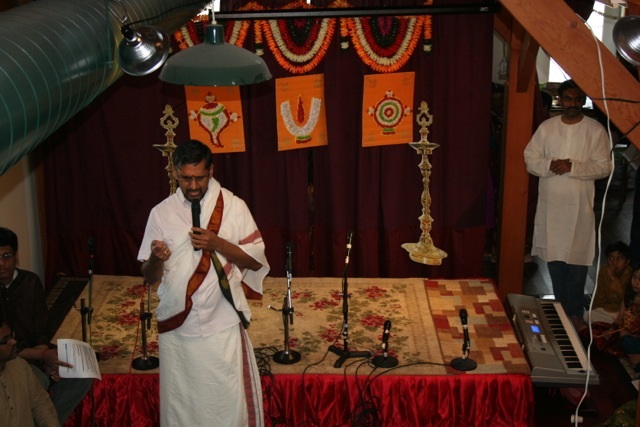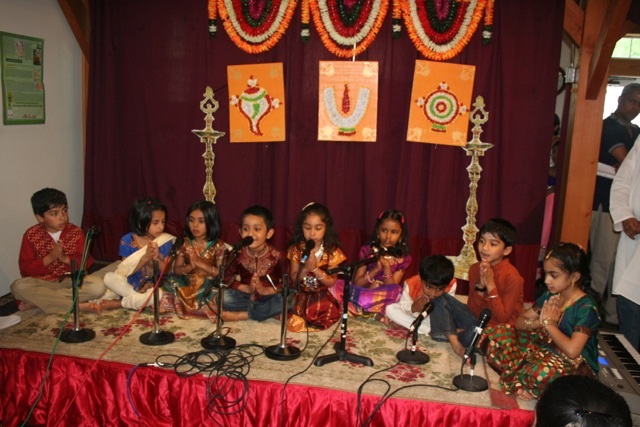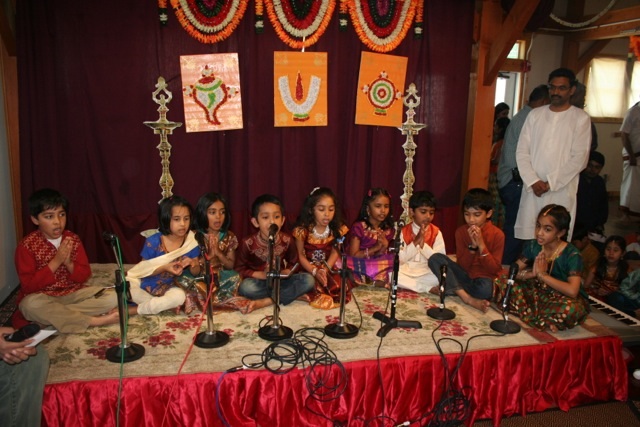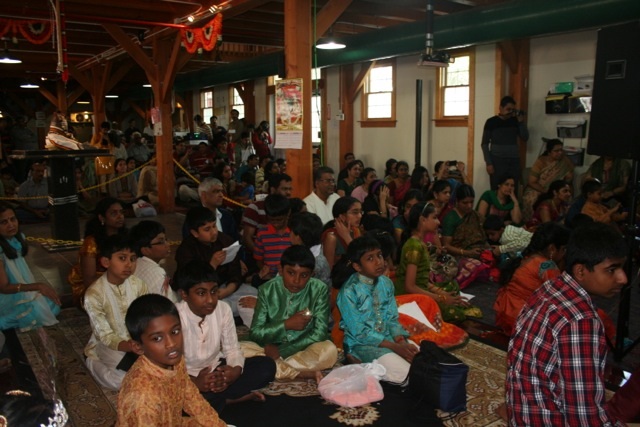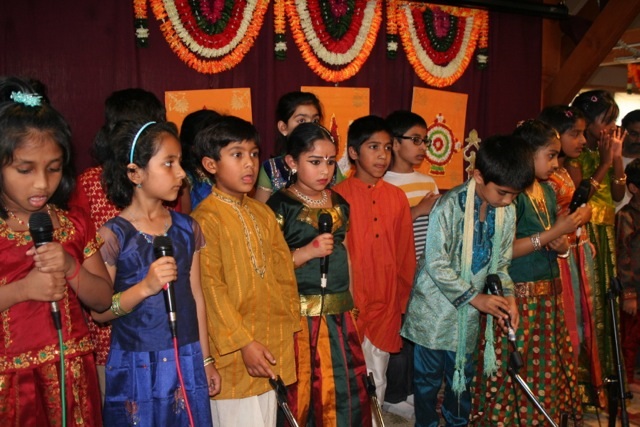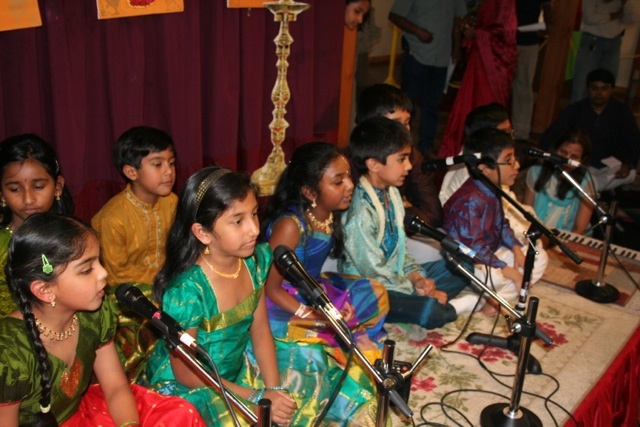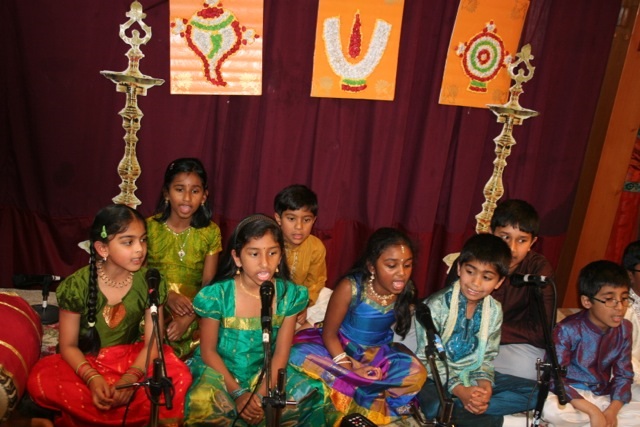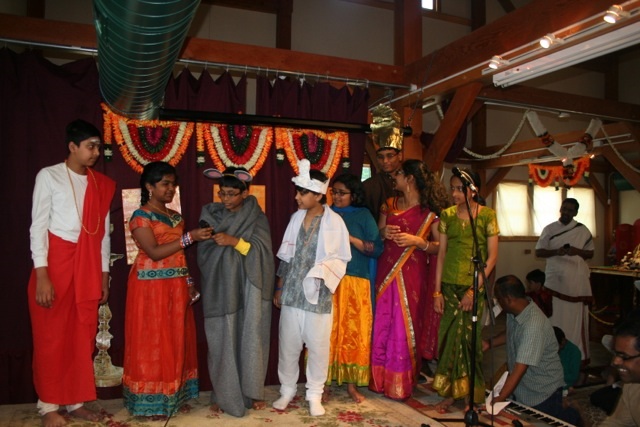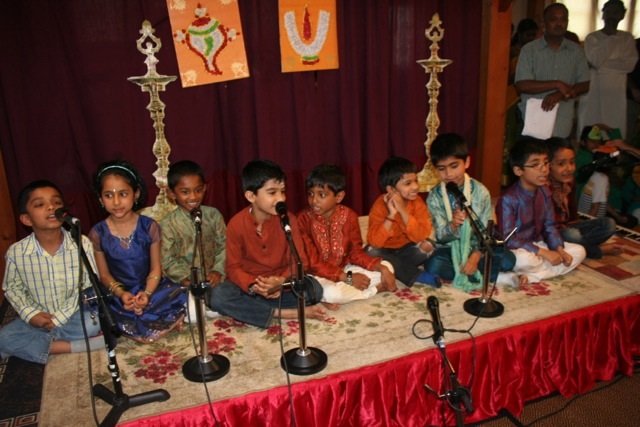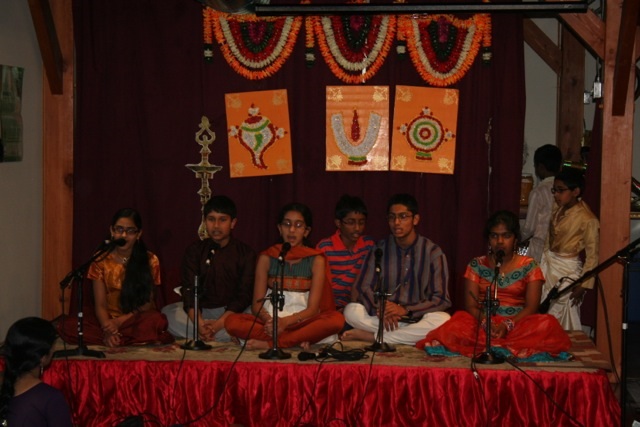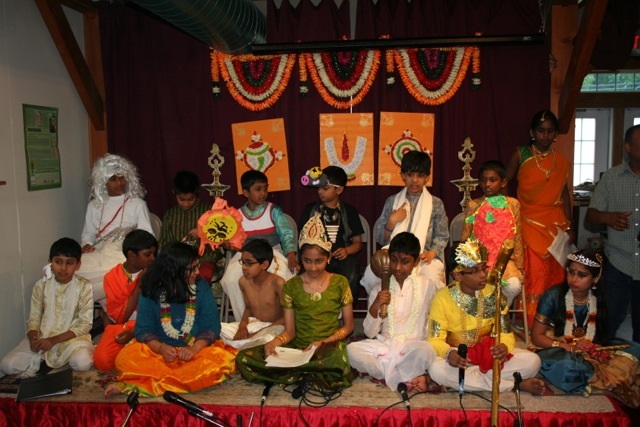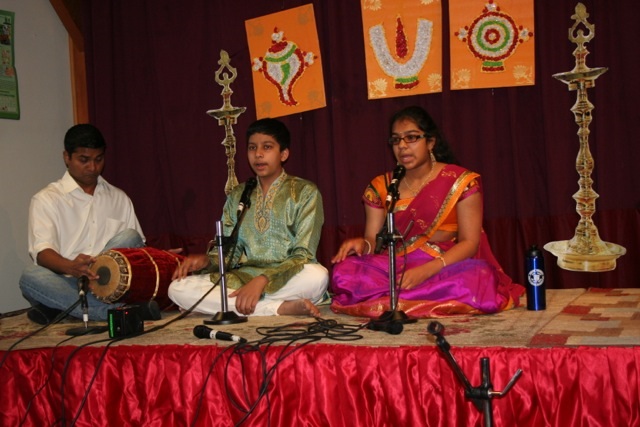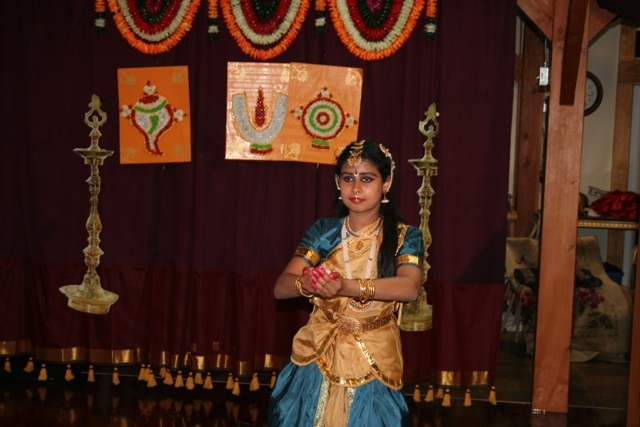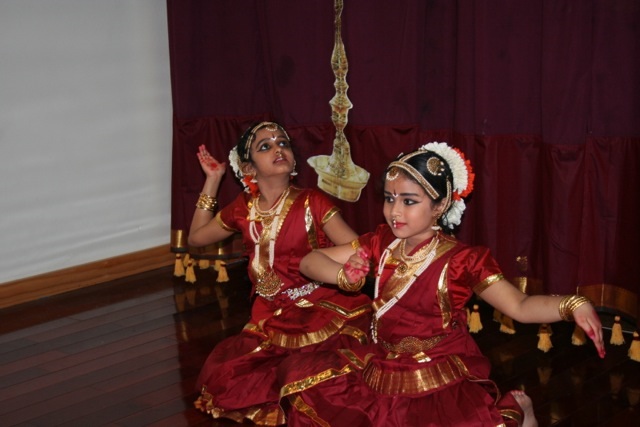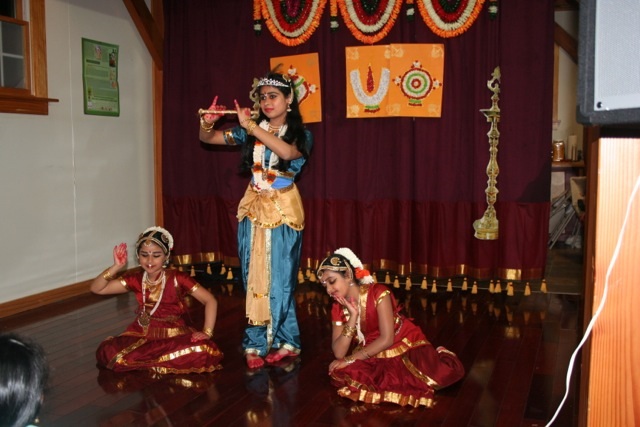Contribute
| Cultural School Of The Hindu Temple Of New Hampshire Celebrates Third Annual Day |
K. Arvind
05/20/2014
Bharathi Vidyashram, the cultural education wing of the Hindu Temple of New Hampshire, Nashua, NH, celebrated its third annual day in a grand manner on Sunday, May 18, 2014, at the Temple premises. The program which ran for more than four and a half hours saw a packed audience that included Temple devotees, teachers, students and their eager and excited siblings, parents and grandparents. The teachers, students and organizers for their part made sure that the program beat the audience’s expectations! In addition to the Bala Gokulam program that was started 3 years ago, the cultural school has now expanded into the larger entity of “Bharathi Vidyashram†(which can be translated as the “Institute of Indian Wisdomâ€) with its scope and curriculum extended to include broader aspects of Indian culture including Indian languages such as Hindi, Tamil and Sanskrit (in collaboration with Samskrita Bharati), Carnatic Music, Yoga, as well as youth leadership programs, in addition to Hindu thought and traditions. Students of the school range in age from 4 years to 17 years, and the school now consists of 5 age-based groups aptly named “Dhruva†(pre-K and kindergarten), “Nachiketa†(grades 1-2), “Prahlada†(grades 3-5), “Shankara-Sharada†(grades 6-8) and “Vivekananda†(grades 9+). The inaugural speech was followed by an invocation of 12 auspicious names of Lord Ganesha, the remover of obstacles. Next came a program by the students of the Hindi class. The students gave brief bio-sketches of themselves in Hindi and then went on to sing a varnamala geet (alphabet song) in Hindi, followed by हम होंगे कामयाब (Ham Honge Kaamyab - Poet Girija Kumar Mathur’s translation of the American Civil Rights anthem “We Shall Overcome†featured in the movie My Name is Khan). Later in the program, students of the Tamil class in the Prahlada group displayed their facility with Tamil by reciting the numbers from 1 to 50 in Tamil, and singing the Tamil Bhajan “Pachai Mayil Vahananeâ€. Next was a recitation of shlokas on Lord Sri Rama and Lord Sri Hanuman by the students of the Nachiketa group. The students of the school’s music program, which is run with great dedication by Usha Dwarak, gave a soul-stirring rendition of Vande Mataram (in Raag Desh), India’s national song, in praise of Bharat Mata, a deity that resided in the hearts of the people present, even though not installed in the Temple! This was followed by a rendition of the Geetam “Mandara Daare†in Raag Khamboji accompanied on the mridangam by Siva. Another group of students then recited the Mahishasura Mardhini Stotram in praise of Devi Sri Durga, followed by the song “Eru Mayileri†(from Thiruppugazh composed by the 15th century Tamil poet and saint Sri Arunagirinathar) with percussion support from Roshan Palakkal. “Eru Mayileri†was sung with great self-confidence again later by 4 year old Deepti Bharat, the youngest student of the school! Senior students from the school’s Advanced Sanskrit Program enacted a Sanskrit play based on the Panchatantra tale of the Rishi who tries to find the most powerful groom for his daughter, who was born as a mouse but was then transformed by him into a beautiful girl. After considering a series of candidate grooms (including the Sun God, the God of the Clouds, the Wind God, the God of Mountains and finally a mouse), who each identify the next one in the sequence as more powerful than themselves, the girl finally decides to marry the mouse. The Shankara-Sharada students also later recited the Kanakadhara Stotram composed by Sri Adi Shankara. Later in the program, students from the Intermediate Sanskrit program, wearing cure masks enacted a Sanskrit skit based on the story of a frog that lives in Key West, Florida, which is courted by all sorts of creatures to be friends with them. The Vivekananda group of students formed pairs and took turns to play Arjuna and Lord Sri Krishna, as they presented verses from the Bhagavad Gita in English depicting Arjuna’s distress and hesitation at having to fight his own kin, and Sri Krishna’s divine advice to him. This was after a context for the Mahabharata war had been set by guess who - a student called Veda Vyas! Each student finally summarized their idea of what they had learned from the dialog between Arjuna and Lord Sri Krishna, with the dominant summary being the importance of doing one’s duty. The Prahlada group of students recited the Dashavatara Stotra, a hymn in praise of the ten divine forms in which Lord Vishnu incarnated to restore righteousness in the world. The props and costumes were interesting and adorable, with a stick horse used to depict the Kalki Avatar, Vamana Avatar holding a designer umbrella and Lord Sri Rama wearing glasses. A comical moment occurred just before this, when two of the avatars went missing for a few minutes causing the piece to be delayed! Latha Dasari’s quiz program that followed tested the students and the audience on their knowledge of Dashavatara, and the participants came out in flying colors. Neel Dhanraj, a boy scout, spoke about a Temple project that he implemented, in order to meet the community service project requirements prescribed for attaining the highest-attainable Boy Scouts rank of an Eagle Scout. Neel led a team of boy scouts, most of whom were not of Indian origin and had little prior exposure to Hindu culture. Under Neel’s guidance they have built a beautiful mandapam that houses one of the shrines in the Temple now. The mandapam highlights how the influence of Hindu Temple of New Hampshire is spreading to the wider community in Nashua, beyond the Hindu devotees. Sindhu Donepudi and Vedavyas Munugoor from the “music group†sang a Telugu krithi on Lord Venkateswara, and English notes composed by Sangita Kalanidhi Sri Harikesanallur Sri Muthiah Bhagavatar. This was followed by a rendering of Sri Annamacharya’s Jo Achuthananda, a traditional lullaby for Lord Sri Krishna. Aditi Dinesh, Anu Prasad, and Shruthi Sriram gave a beautiful Bharatanatyam recital that included “Theeratha Vilayattu Pillai†depicting the pranks of young Lord Sri Krishna, and Sri Annamacharya’s “Dolaayaam†describing the ten avatars of Lord Sri Vishnu. The program concluded with a vote of thanks by Lakshmi Munugoor, the prime mover behind Bharathi Vidyashram, recognizing the contributions of the dedicated volunteer corps whose selfless service makes this effort possible. Bharathi Vidyashram is fulfilling an important need of the Indian community in the Nashua area. As the Tamil poet Thiruvalluvar says in the millenia-old collection of verses known as Thirukkural: கà¯à®´à®²à®¿à®©à®¿ தியாழினி தெனà¯à®ªà®¤à®®à¯ மகà¯à®•à®³à¯ மழலைசà¯à®šà¯Šà®²à¯ கேளா தவர௠kuzhalinidhi yaazhinidhu enbadam makkal mazhalaich chol kelaadhavar The sweet voice of their child sounds more melodious to parents than music from the finest instruments. If this voice carried the eternal wisdom of their own culture, could there be a greater blessing? Please take the time to click on the links in this article, which augment the text in significant and valuable ways.
The program, a grand talent show bubbling with energy and enthusiasm was organized by a team led by PremAnand Rao, and was compered excellently by Krithika Suresh and Nishanth Ganeshbabu. The bright and colorful costumes of the participants were complemented by a well-designed backdrop painted with sacred Hindu symbols placed between two traditional lamps. The program started with a speech introducing Bharathi Vidyashram by Veeramani Ranganathan, one of the founders and the key force behind the Hindu Temple of New Hampshire. Other speakers included Raidu Rayasam who used a story from the Upanishads and a shloka (विदà¥à¤¯à¤¾ ददाति विनयमà¥) to drive home the point that mere acquisition of knowledge is not a worthy goal - the knowledge acquired should be combined with humility, integrity and strength for it to be effective.
The Shankara Sharada students gave a presentation on the Vedic units of measuring time explaining terms such as Yuga and Manvantara, and the factors to convert to modern units of time. They also explained how the Vedic units of time are used in the Sankalpam statement that is recited before poojas.
You may also access this article through our web-site http://www.lokvani.com/
